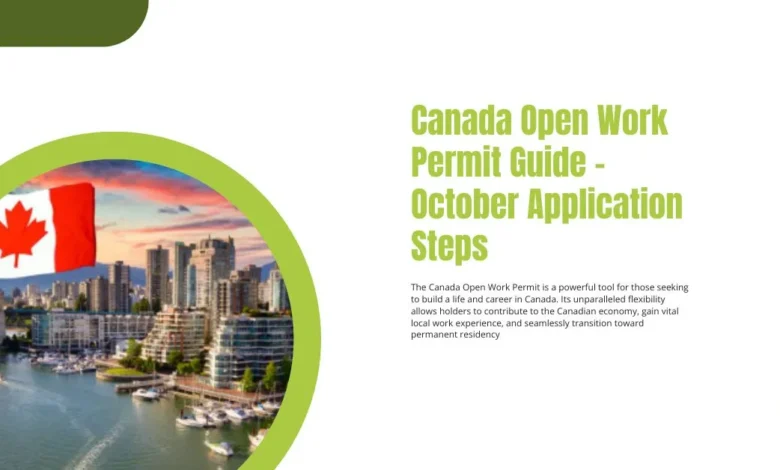Canada Open Work Permit Guide – October Application Steps

Canada consistently ranks among the top destinations for professionals and families seeking not just a job but a high quality of life and a clear pathway to permanent residency. In 2025, the demand for work permits is projected to grow as the nation continues to bolster its economy by welcoming global talent. Among the various options, the Canada Open Work Permit stands out as one of the most flexible, allowing holders to work for almost any employer across the country without the need for a specific job offer at the time of application.
This comprehensive guide for 2025 provides all the essential information you need covering the different types of open work permits, eligibility criteria, required documents, a step-by-step application process, and the significant benefits that can pave your way to building a future in Canada.
What is a Canada Open Work Permit?
A Canada Open Work Permit is a unique authorization that allows a foreign national to work for any employer in Canada, with very few restrictions. Unlike an employer-specific work permit that ties you to a single job, an open work permit offers unparalleled flexibility and mobility. This makes it an ideal choice for those seeking to gain valuable Canadian work experience, explore different employment opportunities, or accompany a spouse or partner who is studying or working in Canada.
Types of Canada Open Work Permits
Open work permits are categorized based on the applicant’s circumstances. While the conditions differ, they all share the key benefit of not requiring a Labour Market Impact Assessment (LMIA) or a pre-arranged job offer.
- Spousal Open Work Permit: For spouses and common-law partners of:
- Skilled foreign workers in Canada.
- Full-time international students at a designated learning institution.
- Post-Graduation Work Permit (PGWP): For international students who have graduated from an eligible Canadian designated learning institution. It can be valid for up to three years, depending on the length of the study program.
- Bridging Open Work Permit (BOWP): For individuals who have applied for permanent residence under certain economic programs (like Express Entry) and whose current work permit is about to expire. It allows them to continue working while their PR application is processed.
- Open Work Permit for Vulnerable Workers: For temporary foreign workers who are experiencing abuse or are at risk of abuse in their workplace.
- Other Categories: Includes permits for refugees, claimants, and participants in certain international exchange programs.
Eligibility Criteria
Eligibility is specific to each permit category, but general requirements include:
- Holding a valid temporary resident status if applying from within Canada.
- Meeting standard Canadian entry requirements (valid passport, etc.).
- Providing proof you fall under an eligible category (e.g., marriage certificate for a spousal permit, graduation certificate for a PGWP).
- Demonstrating you are admissible to Canada (no serious criminality or health issues).
- Proving financial sufficiency to support yourself and family members upon arrival.
Required Document Checklist
A complete application is critical. While documents vary by category, you will typically need:
- Valid passport.
- Recent passport-sized photographs.
- Completed application form (IMM 5710 for most inland applications).
- Proof of eligibility for the specific category:
- Spousal: Marriage certificate and proof of partner’s status (study permit/work permit).
- PGWP: Official transcripts and a letter of completion from your school.
- BOWP: Acknowledgment of Receipt (AOR) for your permanent residence application.
- Proof of payment for applicable fees.
- Biometrics (if required for your nationality).
- Medical examination results (if required).
Step-by-Step Application Process
- Determine Your Eligibility & Permit Type: Identify which open work permit category you qualify for (e.g., Spousal, PGWP, BOWP).
- Gather Your Documents: Collect all necessary documents as per the official IRCC checklist for your specific situation.
- Complete the Application Online: Most applicants must apply through the IRCC online portal. Fill out the forms accurately and truthfully.
- Pay the Required Fees: The total fee typically includes the CAD $155 work permit processing fee and the CAD $100 open work permit holder fee.
- Submit Your Application: Upload all documents and submit your application through your IRCC secure account.
- Provide Biometrics and Medical Exam (if requested): You may receive a Biometrics Instruction Letter. Schedule an appointment at a Visa Application Centre (VAC). A medical exam may also be required.
- Wait for Processing: Processing times can vary from 2 to 5 months. You can check current times on the IRCC website.
- Receive Your Permit: If approved, you will receive a Port of Entry (POE) Letter of Introduction (if applying from outside Canada) or your work permit will be mailed to you (if applying from within Canada).
Fees, Processing Time, and Validity
- Fees:
- Work Permit Processing Fee: CAD $155
- Open Work Permit Holder Fee: CAD $100
- Biometrics Fee: CAD $85 per person
- Processing Time: Varies by country and application volume. Check the official IRCC website for the most current processing times for your location.
- Validity: The validity period depends on the category:
- PGWP: Up to 3 years, based on study program length.
- Spousal Permit: Usually matches the validity of the spouse’s study or work permit.
- BOWP: Typically issued for 1 year.
Advantages of an Open Work Permit
- Maximum Flexibility: Work for any employer in Canada, in almost any industry.
- No Job Offer Needed: You can apply before securing employment.
- Pathway to PR: Gain crucial Canadian work experience that significantly boosts your profile for permanent residency programs like Express Entry.
- Family Friendly: Allows your spouse to accompany you and potentially obtain their own work or study permit.
Conclusion
The Canada Open Work Permit is a powerful tool for those seeking to build a life and career in Canada. Its unparalleled flexibility allows holders to contribute to the Canadian economy, gain vital local work experience, and seamlessly transition toward permanent residency. By understanding the specific category you qualify for, preparing a meticulous application, and adhering to IRCC guidelines, you can successfully obtain this permit and embark on a rewarding journey in one of the world’s most welcoming countries.
Frequently Asked Questions
-
What is the typical processing time and cost?
Processing Time: Can vary from 2 to 5 months, depending on the volume of applications and your country of residence.
Cost: The total government fees are typically CAD $255 (comprising a $155 work permit processing fee and a $100 open work permit holder fee). Additional costs for biometrics may apply. -
Can I bring my family with me?
Yes. In most cases, your spouse or common-law partner and dependent children can accompany you. Your spouse may also be eligible to apply for their own open work permit, and your children can obtain a study permit to attend Canadian schools



